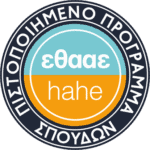Μηνιαίο Σεμινάριο Φιλοσοφίας ΚΕΕΦ 2025
Κύκλος Συναντήσεων – Πλάτωνος Πολιτεία Ε-Ζ
ΑΝΑΚΟΙΝΩΣΗ
Το Κέντρον Ερεύνης της Ελληνικής Φιλοσοφίας της Ακαδημίας Αθηνών
στο πλαίσιο του Μηνιαίου Σεμιναρίου Φιλοσοφίας
Σας προσκαλεί στην επόμενη διάλεξη του κύκλου συναντήσεων
Πλάτωνος Πολιτεία Ε-Ζ
με ομιλήτρια την Mary Margaret McCabe, Ομότιμη Καθηγήτρια Φιλοσοφίας
στο Βασιλικό Κολλέγιο του Πανεπιστημίου του Λονδίνου,
με θέμα: Prisoners just like us?*
*Ακολουθεί περίληψη.
Η συνάντηση θα πραγματοποιηθεί
στο Princeton Athens Center (Τιμάρχου 3, 11634 Αθήνα)
την Τετάρτη 22 Οκτωβρίου 2025, 6-8 μμ (ώρα Ελλάδος).
Οι ενδιαφερόμενοι μπορούν να το παρακολουθήσουν διαδικτυακά
μέσω της εφαρμογής Zoom είτε με φυσική παρουσία.
Για κράτηση θέσεων παρακαλείσθε να απευθύνεστε
στο email: xbourloyanni@gmail.com
Θα τηρηθεί σειρά προτεραιότητας λόγω περιορισμένων θέσεων.
Οι διοργανωτές: Αλέξανδρος Νεχαμάς, Θανάσης Γκατζάρας, Ξανθίππη Μπουρλογιάννη
————————–
Monthly Philosophical Seminar RCGP 2025
Seminar Series – Plato’s Republic V-VII
ANNOUNCEMENT
The Research Centre for Greek Philosophy at the Academy of Athens
in the course of the Monthly Philosophical Seminar
invites you to the upcoming lecture of the seminar series
Plato’s Republic V-VII
by Mary Margaret McCabe, Emerita Professor of Philosophy
at King’s College London,
on: Prisoners just like us?*
* You may find the abstract below.
The Seminar will take place
at the Princeton Athens Center (Timarchou 3, 11634 Athens)
on Wednesday 22 October 2025, 6-8pm (Athens GR local time).
Those interested may attend
online via Zoom or in person.
To reserve a seat please contact
xbourloyanni@gmail.com
Due to limited seating, priority will be observed.
The organizers: Alexander Nehamas, Thanassis Gkatzaras, Xanthippe Bourlogianni
Σύνδεσμος Zoom: Zoom Link Plato’s Republic V-VII
Abstract
When Socrates glosses his story of the prisoners in the cave, he remarks that they are ‘like us’: and a good deal of ink has been spilt on what he means. But what is not often noticed is that a running theme of the Republic from the very beginning is the complex interpretation of ‘us’ (I have called this ‘the wandering “we”’). This complexity, I shall suggest, is central to Plato’s discussion of education and its failure in the sequel to the cave. I shall focus on two ways of understanding why the prisoners may indeed be just like us. First of all, I shall argue, the role of ‘us’ is of central importance to the epistemology and the methodology of the Republic as a whole. This takes us in the direction of a Platonic epistemology that has an essential social component — hardly surprising, I claim, given the way Plato writes. Second, I shall propose, the theme of ‘us’ can help us to understand the ethical and political connotations of the acquisition of knowledge, both within Kallipolis and elsewhere. The appeal to justice is, after all, built into the social dimension of the Platonic account of knowledge, so that the assumption that those who have been educated are just turns out to be well-founded. Both aspects of the epistemology of the Republic are central to understanding how different the Platonic conception of knowledge is from that commonly assumed in the post-Cartesian tradition.

